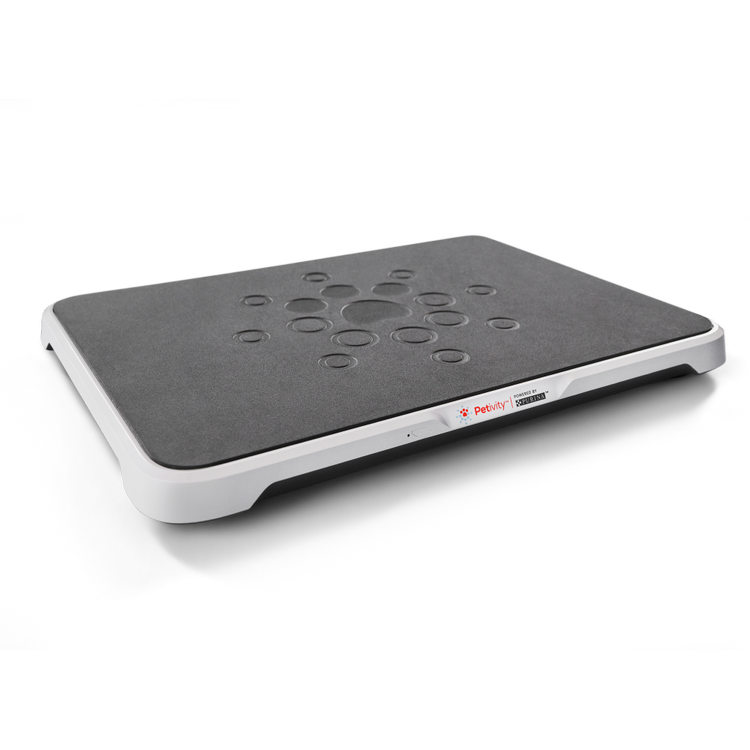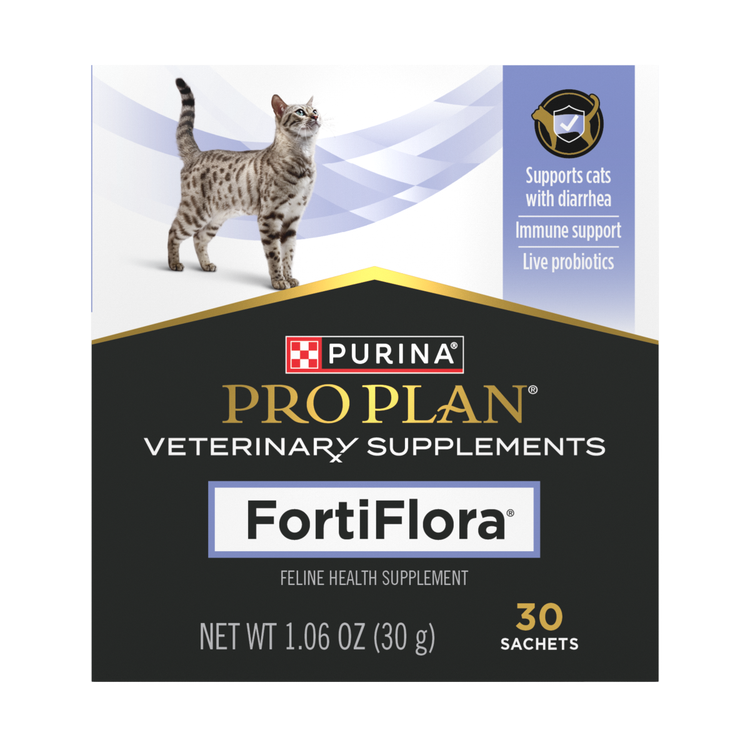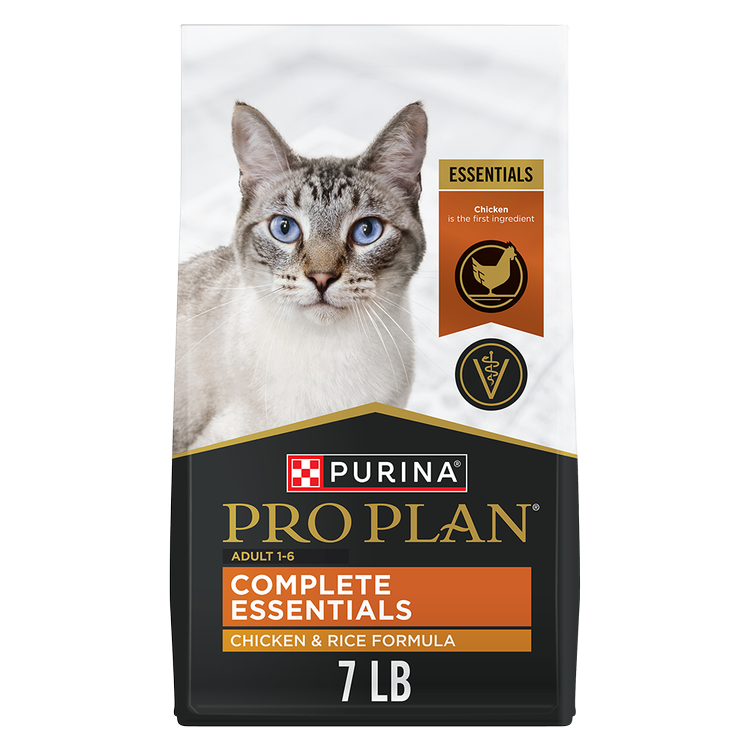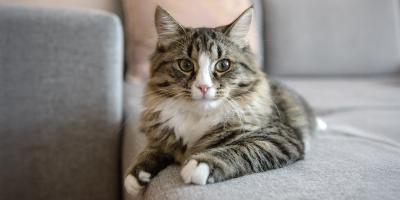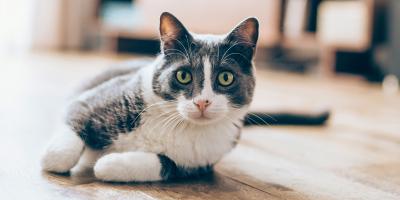Cat Diarrhea: Causes, Symptoms & Treatment


Any time your cat isn’t feeling well, it’s natural to want to know why and what you can do to make them feel better.
It’s concerning when your cat has diarrhea. On top of your kitty not feeling well, diarrhea makes the litter box a mess. There are many potential causes of digestive upset in cats, ranging from simple to complex. If your cat’s diarrhea persists for more than 24 hours, includes blood, or is accompanied by lethargy and a lack of appetite, seek veterinary help as soon as possible.
Your veterinarian can help you determine the cause of your cat’s diarrhea and make recommendations, such as a special diet or probiotics, to help your cat feel better.
Symptoms of Cat Diarrhea
Diarrhea is a symptom of an underlying condition and is characterized by bowel movements that are soft or liquid.
The ideal cat poop should be firm, but not hard, and pliable. It may be segmented in appearance and leaves little to no residue in the litter box when it is scooped. Signs of cat diarrhea can range from excrement that is moist and soggy but still log shaped to watery with no texture that is left in flat puddles.
Causes of Diarrhea in Cats
There are many potential causes for occasional diarrhea in cats. The cause of your cat’s diarrhea dilemma might be a reaction to something he or she ate. This can include:
- A new diet – or transitioning to a new diet too quickly
- Eating food meant for people, including milk and cream
- Ingesting rodents, birds, foreign objects, or toxic substances
Cats may become ill or stop eating when their diet changes too abruptly. This can happen when a new food alters the intestinal environment, which may lead to diarrhea, vomiting, and a refusal to eat.
This is why Purina Chief Veterinary Officer, Dr. Kurt Venator, recommends gradually weaning your cat off his or her current food and onto the new one. This means transitioning your cat’s food over a period of 7 to 10 days, gradually increasing the amount of their new food, and reducing the amount of their old food each day.
There are several underlying health conditions that cause diarrhea. With inflammation of the colon, known as colitis, diarrhea can last for weeks and recur periodically. Symptoms of colitis may include blood or mucus in the stools and frequent defecation in small amounts. It can be caused by:
- Parasites
- Food allergy
- Bacterial, viral, or fungal infection
- Stress
Other potential causes of diarrhea in cats include:
- Antibiotics or other medications
- Inflammatory Bowel Disease (IBD)
- Liver disease
- Pancreatitis
- Hyperthyroidism
- Cancer
If you suspect colitis or another serious condition, a thorough examination by a vet is in order. Your vet will most likely ask you to bring in a fresh stool sample and may recommend other tests such as blood work and imaging.
How to Treat Cat Diarrhea
The choice of a cat diarrhea treatment depends on the cause. When intestinal parasites are to blame, your vet will prescribe a medication to eliminate the parasites. When the microbiome has shifted, your vet may prescribe probiotics.
In some cases, such as with IBD, your vet may recommend a therapeutic diet. Following the advice and recommendations of your veterinarian is the quickest way to help your cat feel better.
What can you give your cat for diarrhea? The first thing is access to fresh, clean water. Because diarrhea can cause dehydration, make sure water is readily available. Try a wide and shallow water bowl or even a cat water fountain to help prevent dehydration. Your vet might recommend a hydration supplement such as a nutrient water that can improve your cat’s hydration status.
Probiotics may help cats with diarrhea. Probiotics are live bacteria that can positively alter the existing microbiome of your cat. Not all probiotic supplements are created equal, and it’s best to get a recommendation from your vet.
What do you feed a cat with diarrhea? Your vet might recommend a special diet for a cat with diarrhea. The best cat food for diarrhea is one that’s compatible with their specific digestive needs and one they will eat.
Can you stop diarrhea in cats? The best course of action is to monitor your cat for other symptoms and call your veterinarian. Don’t try any new foods, treats, medications, supplements, or home remedies for cat diarrhea without your veterinarian’s recommendation. Anything new or out of the ordinary could worsen your cat’s symptoms.
When to See a Vet About Cat Diarrhea?
Contact your vet if your cat has diarrhea to determine if he or she should be seen for an examination. Chronic or recurring diarrhea may be a sign of a more serious underlying condition that your vet needs to address.
Before your appointment, keep track of your cat’s symptoms and note the frequency of their bowel movements and the appearance of the stool. The Petivity Smart Litter Box Monitor system keeps track of your cat’s visits to the box and alerts you to any changes in urine and fecal output.
Monitor your cat for changes in behavior and demeanor. Other symptoms, such as lethargy, lack of appetite, vomiting, decreased water intake, or other unusual symptoms, can indicate underlying health issues your veterinarian will want to investigate.
Your veterinarian can diagnose the source of the problem and recommend an appropriate treatment to help your cat return to health.
Want more cat health tips? Get advice from our experts with our other cat health articles.

Be Rewarded for Your Purina Purchases
Earn and redeem points for Purina products with myPurina app.

